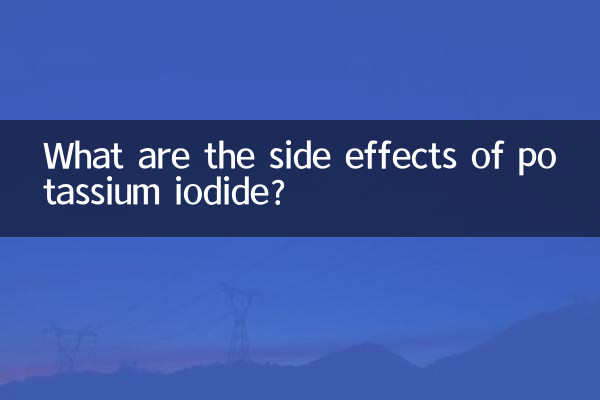What are the side effects of potassium iodide?
Recently, discussions about potassium iodide have become increasingly popular on social media and health forums, especially its application in the fields of nuclear emergency protection and thyroid disease treatment, which has attracted widespread attention. This article will combine the hot topics on the Internet in the past 10 days to conduct a structured analysis of the side effects and related precautions of potassium iodide.
1. Main uses of potassium iodide

Potassium iodide is an inorganic compound mainly used clinically for:
| Usage classification | Specific applications |
|---|---|
| Nuclear emergency protection | Block radioactive iodine damage to thyroid gland |
| medical field | Treatment of hyperthyroidism and endemic goiter |
| Industrial field | Photosensitive materials, food additives, etc. |
2. Common side effects of potassium iodide
According to the World Health Organization (WHO) and drug label information, potassium iodide may cause the following adverse reactions:
| System classification | Side effects | incidence |
|---|---|---|
| digestive system | Nausea, vomiting, diarrhea | About 5%-10% |
| skin reaction | Rash, urticaria, facial edema | 3%-5% |
| endocrine system | Thyroid dysfunction (hyperthyroidism or hypothyroidism) | Long-term use can reach 15% |
| allergic reaction | Difficulty breathing, shock (rare) | <1% |
3. Risks of use by special groups of people
In discussions over the past 10 days, the risks of medication use for the following groups of people have been frequently mentioned:
| crowd | Potential risks | Suggestions |
|---|---|---|
| pregnant woman | May cause abnormal fetal thyroid development | Requires strict evaluation by a doctor |
| lactating women | Iodine affects babies through breast milk | Suspend breastfeeding or avoid use |
| Thyroid disease patients | aggravate disease fluctuations | Thyroid function needs to be monitored |
| People with renal insufficiency | Iodine excretion disorder causes accumulation | Use less |
4. Recent hot controversies
1.Controversy over nuclear emergency medicine stockpiling: There is a rush to buy potassium iodide in many places. Experts remind you not to use it unless necessary. Excessive intake may causeiodine poisoning.
2.Risks of online prescriptions: Some short video platforms spread "potassium iodide whitening therapy", and dermatologists warn that it may cause contact dermatitis.
3.Medication safety for children: After the Japanese nuclear sewage treatment incident, parent groups had extensive discussions on the dosage of preventive medication for children.
5. Scientific use suggestions
| Things to note | Specific measures |
|---|---|
| dose control | Not to exceed 150μg per day for adults (preventive dose) |
| Taking time | Best results when taken 24 hours before nuclear exposure |
| Taboo combinations | Avoid use with lithium preparations and antithyroid drugs |
| Monitoring indicators | Long-term users need to check thyroid function regularly |
6. Latest opinions of experts
The "Guidelines for the Use of Potassium Iodide in Nuclear Incidents" updated by the Chinese Center for Disease Control and Prevention in October emphasized:
1. Individuals should not take stable iodine without government instructions
2. A single dose of 130mg can provide 24 hours of protection, and repeated doses must be separated by at least 24 hours.
3. People who are allergic to seafood need to undergo a skin test before use.
Potassium iodide is a special-purpose drug and its use needs to strictly follow medical guidance. Recent hot discussions reflect the public's concern for health protection, but also expose the problem of insufficient knowledge about medication. It is recommended to obtain professional information through formal channels to avoid health risks caused by panic or misunderstanding of online rumors.

check the details

check the details